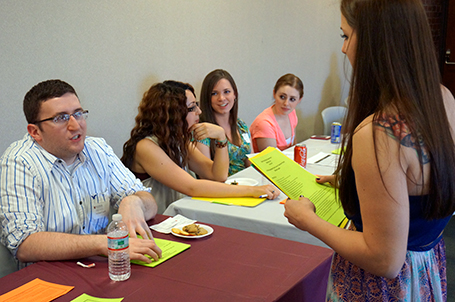Monday, May 5, 2014
A large turnout attended the inaugural Psychology Department Methods Fair on April 21
by Adam Grybowski
Forty-eight student presenters lined the perimeter of Bart Luedeke Center’s fireside lounge on April 21, ready to explain their research to other students. Participating in the inaugural Psychology Department Methods Fair, they chatted with a large crowd of psychology students who turned out on a bright spring day to learn about their options for conducting research at Rider University. Seventy-nine of the 101 invited students attended — a nearly 80 percent turnout for an event that was the first of its kind at Rider.
“There’s a little bit of mystery about what a psychology research methods course entails,” says Tami Musumeci-Szabó, the assistant psychology professor who organized the event. “We wanted to demystify the options students have.”
The event had the potential to especially benefit entering-class students sifting through course offerings. “It can be confusing to know exactly what class offers what,” says Elizabeth Brown ’14, who appeared at the fair to present her senior capstone project on healthy eating.
Psychology students are exposed to a broad range of research methods as part of the curriculum. Second-semester freshman take a course on introduction to research. Following that, they have the option of working one-on-one with a professor in a role similar to a research assistant. Then, as upperclassmen, they’re required to undertake a significant research project within their lab course that builds on the methods they’ve learned, and invited to complete an independent research project in fulfillment of their senior capstone.
“You want students to be excited and engaged about research methods, but in advising and talking to many of them, I found that they didn’t have a sense of what to expect from the different options,” Musumeci-Szabó says. “Students who you think would be interested in the independent study option for capstone weren’t necessarily taking it.”
Figuring out research options earlier allows students to take full advantage of Rider’s opportunities, Musumeci-Szabó says. “Giving them numerous chances to do research is part of what attracts them to Rider in the first place — working in small groups with professors,” she says.
While many psychology majors enter graduate school, others find jobs in fields that have less to do with research. “That doesn’t mean you can’t benefit from the research process,” Musumeci-Szabó says.
After taking one research-focused class, Brown realized research had the potential to create change on a larger scale than one-on-one counseling, causing her to switch her career goal from counseling to research. “You can change the behavior of hundreds of people with intervention programs based on research rather than the limited number with counseling,” she says.
The fair also served as a forum for students to present research-in-progress. “While we do have a wonderful way to present completed work, we didn’t have a place to present works-in-progress,” Musumeci-Szabó says. “The Methods Fair gave students the opportunity to talk about what they’re doing and learning while they’re still cooking.”

